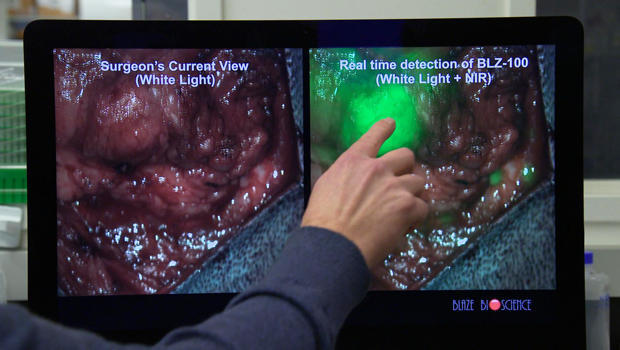On The Horizon: Scorpion venom as cancer treatment
A multitude of potential advances are ON THE HORIZON in the field of cancer research, as reported by Susan Spencer:
Behold, if you dare, the Israeli Deathstalker Scorpion. Its sting is excruciating, its venom can kill.
Sounds terrifying! But Dr. Jim Olson says, "It's actually beautiful."
Beautiful, because the Deathstalker's venom may revolutionize how cancer surgery is done.
Dr. Olson is a brain cancer physician and researcher at Fred Hutchinson Cancer Center in Seattle, Washington.
"We were inspired by a 16-year-old girl who had a brain tumor," he said. "After 12 hours of surgery, the surgeons left behind a big piece. And we decided that day to find a way to make the cancer light up so that surgeons could see it while they're operating."
The key is the scorpion venom, synthetically reproduced, minus the poison. When injected into a patient's bloodstream, it sticks to cancer cells but NOT to normal cells. Combine that sticky molecule with florescent dye and you've got what Olson calls "tumor paint."
So what problem does tumor paint solve? "Sometimes, it's really hard for a surgeon to tell what is cancer and what is normal," Dr. Olson said. "And in the brain, you can't take out a big chunk of normal just to make sure you got the cancer. And tumor paint distinguishes clearly the difference between brain cancer and normal brain in all of our experiments that we've done so far."
Check out this image of a cancerous tumor … inject tumor paint, and there's no mistaking it. The tumor lights up.
"So this is definitive? I can see why you're excited about this," said Spencer.
"I am thrilled about this."
"You're sort of turning nature upside down, right?"
"That's exactly what we're doing!" he laughed.
Sounds a lot like science fiction, but Dr. Olson says it could be an FDA-approved reality as soon as 2019.
"I think this will potentially be the biggest improvement in cancer surgery, maybe, in 50 years," he said.
"God bless the Israeli Deathstalker scorpion!"
"Exactly, exactly. Well, and God bless our patients. Because, you know, they're the ones that motivate us to do this."
See also:
For more info:





